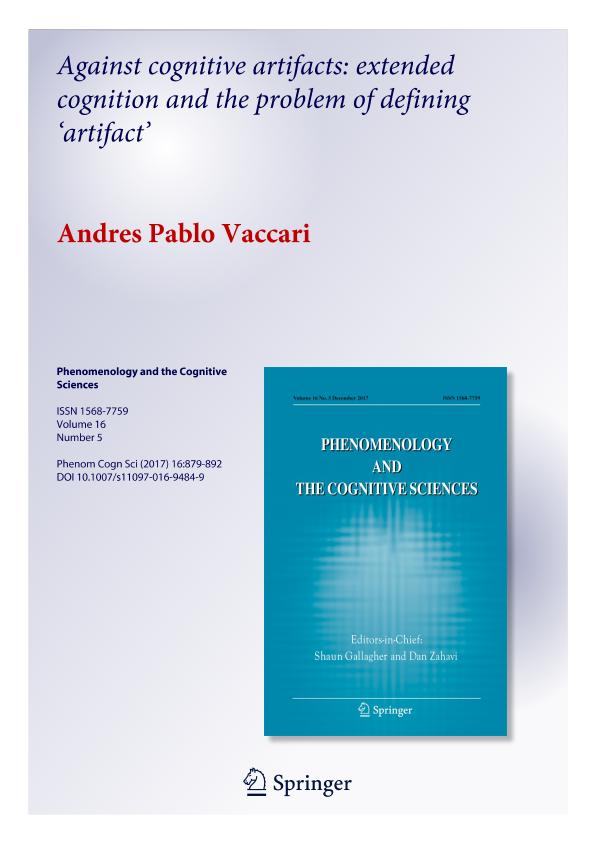Mostrar el registro sencillo del ítem
dc.contributor.author
Vaccari, Andrés

dc.date.available
2018-12-04T18:29:56Z
dc.date.issued
2017-12
dc.identifier.citation
Vaccari, Andrés; Against cognitive artifacts: Extended cognition theory and the problem of defining artifact; Springer Netherlands; Phenomenology and the Cognitive Sciences; 16; 5; 12-2017; 879-892
dc.identifier.issn
1572-8676
dc.identifier.uri
http://hdl.handle.net/11336/65748
dc.description.abstract
In this paper I examine the notion of ‘artifact’ and related notions (namely, ‘cognitive artifact’) in the dominant version of extended cognition theory (ECT) grounded on extended functionalism. Although the term is ubiquitous in the literature, it is far from clear what ECT means by it. How are artifacts conceptualized in ECT? Is ‘artifact’ a meaningful and useful category for ECT? If the answer to the previous question is negative, should we worry? Is it important for ECT to have a coherent theory of artifacts? And what are the demands and constraints that ECT imposes on this theory? I distinguish between two aspects of ECT, one narrow, aligned with extended functionalism (EF); and one broad or pluralistic, in which EF is combined with other theoretical resources in the context of diverse research programs. I begin by determining the problems in conceptualizing artifacts from EF. Then I address the question of why a concept of artifact may be relevant to ECT. Next, I examine the efforts of Richard Heersmink to combine ECT with dominant theories of artifacts in the philosophy of technology (ECT in its broad aspect). I argue that both approaches fail to yield a meaningful notion of artifact, let alone one of ‘cognitive’ artifact. Finally, I argue that narrow ECT places rather strong constraints on a theory of artifacts, since it locates the specificity of ‘artifact’ in material aspects of realization that are, by definition, outside its theoretical purview. I examine, then discard, the possibility that a materialist and objectivist theory of artifacts may be of help. And finally I briefly explore some ways in which a broad, pluralistic ECT may address some of these shortcomings.
dc.format
application/pdf
dc.language.iso
eng
dc.publisher
Springer Netherlands

dc.rights
info:eu-repo/semantics/openAccess
dc.rights.uri
https://creativecommons.org/licenses/by-nc-sa/2.5/ar/
dc.subject
Cognitive Artifacts
dc.subject
Extended Cognition
dc.subject
Extended Functionalism
dc.subject
Metaphysics of Artifacts
dc.subject.classification
Estudios Religiosos

dc.subject.classification
Filosofía, Ética y Religión

dc.subject.classification
HUMANIDADES

dc.title
Against cognitive artifacts: Extended cognition theory and the problem of defining artifact
dc.type
info:eu-repo/semantics/article
dc.type
info:ar-repo/semantics/artículo
dc.type
info:eu-repo/semantics/publishedVersion
dc.date.updated
2018-10-29T15:12:03Z
dc.journal.volume
16
dc.journal.number
5
dc.journal.pagination
879-892
dc.journal.pais
Países Bajos

dc.journal.ciudad
Amsterdam
dc.description.fil
Fil: Vaccari, Andrés. Consejo Nacional de Investigaciones Científicas y Técnicas. Centro Científico Tecnológico Conicet - Patagonia Norte; Argentina. Universidad Nacional de Río Negro. Sede Andina. Centro de Estudios en Ciencia, Tecnología, Cultura y Desarrollo; Argentina
dc.journal.title
Phenomenology and the Cognitive Sciences
dc.relation.alternativeid
info:eu-repo/semantics/altIdentifier/doi/https://dx.doi.org/10.1007/s11097-016-9484-9
dc.relation.alternativeid
info:eu-repo/semantics/altIdentifier/url/https://link.springer.com/article/10.1007/s11097-016-9484-9
Archivos asociados
